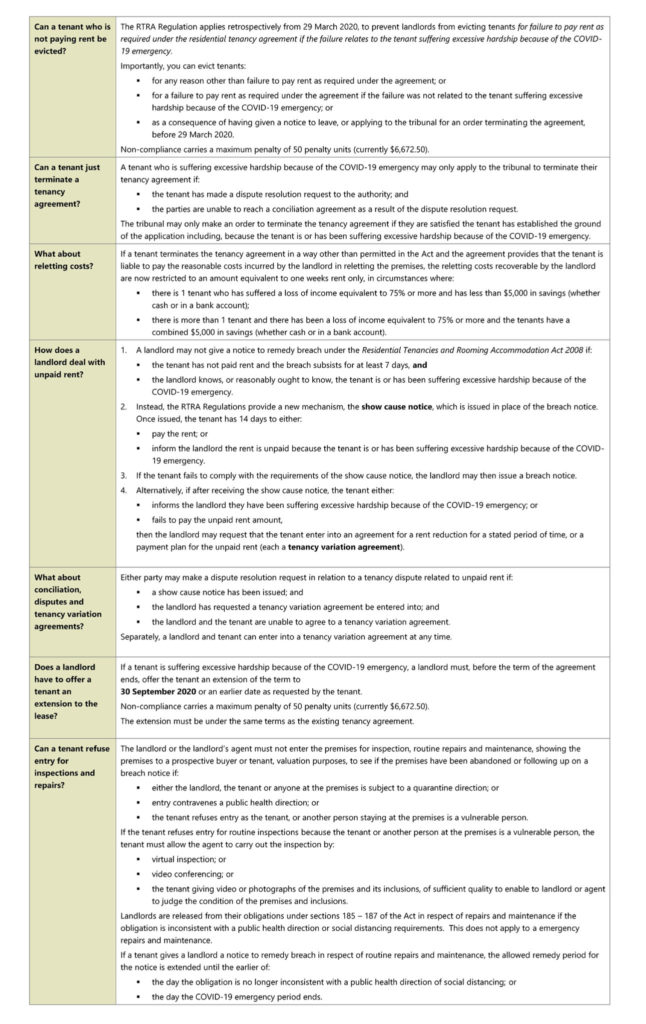WHO SHOULD READ THIS
- Landlords and tenants of residential properties in Queensland. Particularly where a tenant is suffering financial hardship because of COVID-19.
WHAT YOU NEED TO KNOW
- Queensland Parliament have passed the COVID-19 Emergency Response Act 2020, which amends the Residential Tenancies and Rooming Accommodation Act 2008 (Act) and allows regulations to be made to respond to the COVID-19 emergency.
- The Residential Tenancies and Rooming Accommodation (COVID-19 Emergency Response) Regulation 2020 (RTRA Regulations) significantly alters the status quo in respect to the rights of both parties in a residential tenancy.
- The RTA have released a Practice Guide for Residential Tenancies, which helps guide landlords and tenants through the impacts of the COVID-19 pandemic.
WHAT YOU NEED TO DO
- Understand the important provisions of the RTRA Regulations as they apply to your circumstances as these regulations significantly alter the legal rights of both parties.
- Ensure you are accessing the most recent publications on the topic. Earlier commentary may no longer be accurate as the initial announcements of government proposed a framework, which has now been significantly changed following industry feedback and consultation.
- Landlords should seek legal advice if a tenant notifies them they are suffering from hardship because of COVID-19.
Background
On 9 April 2020, Mick de Brenni MP announced the Palaszczuk Government were going to implement a retrospective moratorium on evictions due to rent arrears for Queensland tenants impacted by COVID-19. He also announced that landlords would be required to offer a six month extension to the tenant if their lease expired during the COVID-19 public health crisis. Finally, Minister de Brenni announced that, where a tenant could not pay rent due to the impacts of coronavirus and wanted to end their lease early, they would be empowered to legally do so.
In response to concerns tenants could and would be able to unfairly take advantage of the proposed regulations, the Palaszczuk Government consulted widely with peak industry bodies. This resulted in thresholds being put in place to limit the scope and application of the extraordinary protections, requiring additional transparency from tenants when claiming hardship and, importantly, enshrining protections for victims of domestic violence.
Who is protected under the RTRA Regulations?
The protections granted by the RTRA Regulations only apply if the person suffers excessive hardship because of the COVID-19 emergency, which is limited to circumstances where:
- the person, or another person under the person’s care, suffers from COVID-19;
- the person is subject to a quarantine direction;
- the person’s place of employment is closed, or the trade or business conducted by the person’s employer is restricted, because of a public health direction, including for example, because a public health direction has closed a major supplier or customer of the person’s employer;
- the person is self-isolating because the person is a vulnerable person, lives with a vulnerable person or is the primary carer for a vulnerable person;
- a restriction on travel, imposed under a public health direction or other law, prevents the person working or returning home;
- the COVID-19 emergency prevents the person leaving or returning to Australia; and
- the person –
- suffers a loss of income of 25% or more; or
- the rent payable by the person under a residential tenancy agreement or rooming accommodation agreement is 30% or more of the person’s income.
- However, if there is more than one (1) tenant or resident under the residential tenancy agreement or rooming accommodation agreement the threshold is for all tenants or residents.
Troubleshooting – questions and answers

For further information on any of the issues raised in this alert, please contact our team below.
